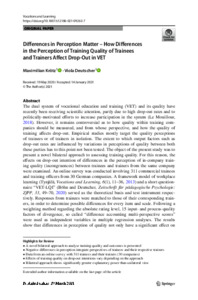|
Differences in perception matter – How differences in the perception of training quality of trainees and trainers affect drop-out in VET
Krötz, Maximilian
;
Deutscher, Viola
![[img]](https://madoc.bib.uni-mannheim.de/55594/1.hassmallThumbnailVersion/Kr%C3%B6tz-Deutscher2021_Article_DifferencesInPerceptionMatterH.pdf)  Vorschau |
|
PDF
Krötz-Deutscher2021_Article_DifferencesInPerceptionMatterH.pdf
- Veröffentlichte Version
Download (915kB)
|
|
DOI:
|
https://doi.org/10.1007/s12186-021-09263-7
|
|
URL:
|
https://madoc.bib.uni-mannheim.de/55594
|
|
Weitere URL:
|
https://link.springer.com/article/10.1007/s12186-0...
|
|
URN:
|
urn:nbn:de:bsz:180-madoc-555941
|
|
Dokumenttyp:
|
Zeitschriftenartikel
|
|
Erscheinungsjahr:
|
2021
|
|
Titel einer Zeitschrift oder einer Reihe:
|
Vocations and Learning
|
|
Band/Volume:
|
14
|
|
Heft/Issue:
|
3
|
|
Seitenbereich:
|
369-409
|
|
Ort der Veröffentlichung:
|
Dordrecht
|
|
Verlag:
|
Springer Netherlands
|
|
ISSN:
|
1874-785X , 1874-7868
|
|
Sprache der Veröffentlichung:
|
Englisch
|
|
Einrichtung:
|
Fakultät für Betriebswirtschaftslehre > Wirtschaftspädagogik, Kompetenzentwicklung und Ausbildungsqualität (Deutscher 2016-2024)
|
|
Bereits vorhandene Lizenz:
|
 Creative Commons Namensnennung 4.0 International (CC BY 4.0) Creative Commons Namensnennung 4.0 International (CC BY 4.0)
|
|
Fachgebiet:
|
330 Wirtschaft
370 Erziehung, Schul- und Bildungswesen
|
|
Freie Schlagwörter (Englisch):
|
Vocational education and training ; training quality ; VET ; multiple perspectives ; difference score ; drop-out intention
|
|
Abstract:
|
The dual system of vocational education and training (VET) and its quality have
recently been receiving scientific attention, partly due to high drop-out rates and to
politically-motivated efforts to increase participation in the system (Le Mouillour,
2018). However, it remains controversial as to how quality within training companies
should be measured, and from whose perspective, and how the quality of
training affects drop-out. Empirical studies mostly target the quality perceptions
of trainees or of trainers in isolation. The extent to which output factors such as
drop-out rates are influenced by variations in perceptions of quality between both
these parties has to this point not been tested. The object of the present study was to
present a novel bilateral approach to assessing training quality. For this reason, the
effects on drop-out intention of differences in the perception of in-company training
quality (incongruences) between trainees and trainers from the same company
were examined. An online survey was conducted involving 311 commercial trainees
and training officers from 30 German companies. A framework model of workplace
learning (Tynjälä, Vocations and Learning, 6(1), 11–36, 2013) and a short questionnaire
“VET-LQI” (Böhn and Deutscher, Zeitschrift für pädagogische Psychologie:
ZfPP, 33, 49–70, 2020) served as the theoretical basis and test instrument respectively.
Responses from trainees were matched to those of their corresponding trainers,
in order to determine possible differences for every item and scale. Following a
weighting method regarding the absolute rating level, 15 input- and process-quality
factors of divergence, so called “difference accounting multi-perspective scores”
were used as independent variables in multiple regression analyses. The results
show that differences in perception of quality not only have a significant effect on drop-out intentions, but also explain drop-out intentions more generally, and with
a higher predictive power than the conventional method of merely focusing on the
quality perceptions of trainees (adjusted R2
= .439 > .333).
|
|
Übersetzter Titel:
|
Wahrnehmungsunterschiede entscheiden - Wie sich Wahrnehmungsunterschiede der Ausbildungsqualität zwischen Auszubildenden und Ausbildenden auf Ausbildungsabbrüche in der Berufsbildung auswirken
(Deutsch)
|
|
Zusätzliche Informationen:
|
Online-Ressource
|
 
 | Dieser Eintrag ist Teil der Universitätsbibliographie. |
 | Das Dokument wird vom Publikationsserver der Universitätsbibliothek Mannheim bereitgestellt. |
 Suche Autoren in Suche Autoren in
Sie haben einen Fehler gefunden? Teilen Sie uns Ihren Korrekturwunsch bitte hier mit: E-Mail
Actions (login required)
 |
Eintrag anzeigen |
|
|
 ORCID: 0000-0003-4302-5390 ; Deutscher, Viola
ORCID: 0000-0003-4302-5390 ; Deutscher, Viola  ORCID: 0000-0002-9714-6465
ORCID: 0000-0002-9714-6465



 Creative Commons Namensnennung 4.0 International (CC BY 4.0)
Creative Commons Namensnennung 4.0 International (CC BY 4.0)

 Suche Autoren in
Suche Autoren in